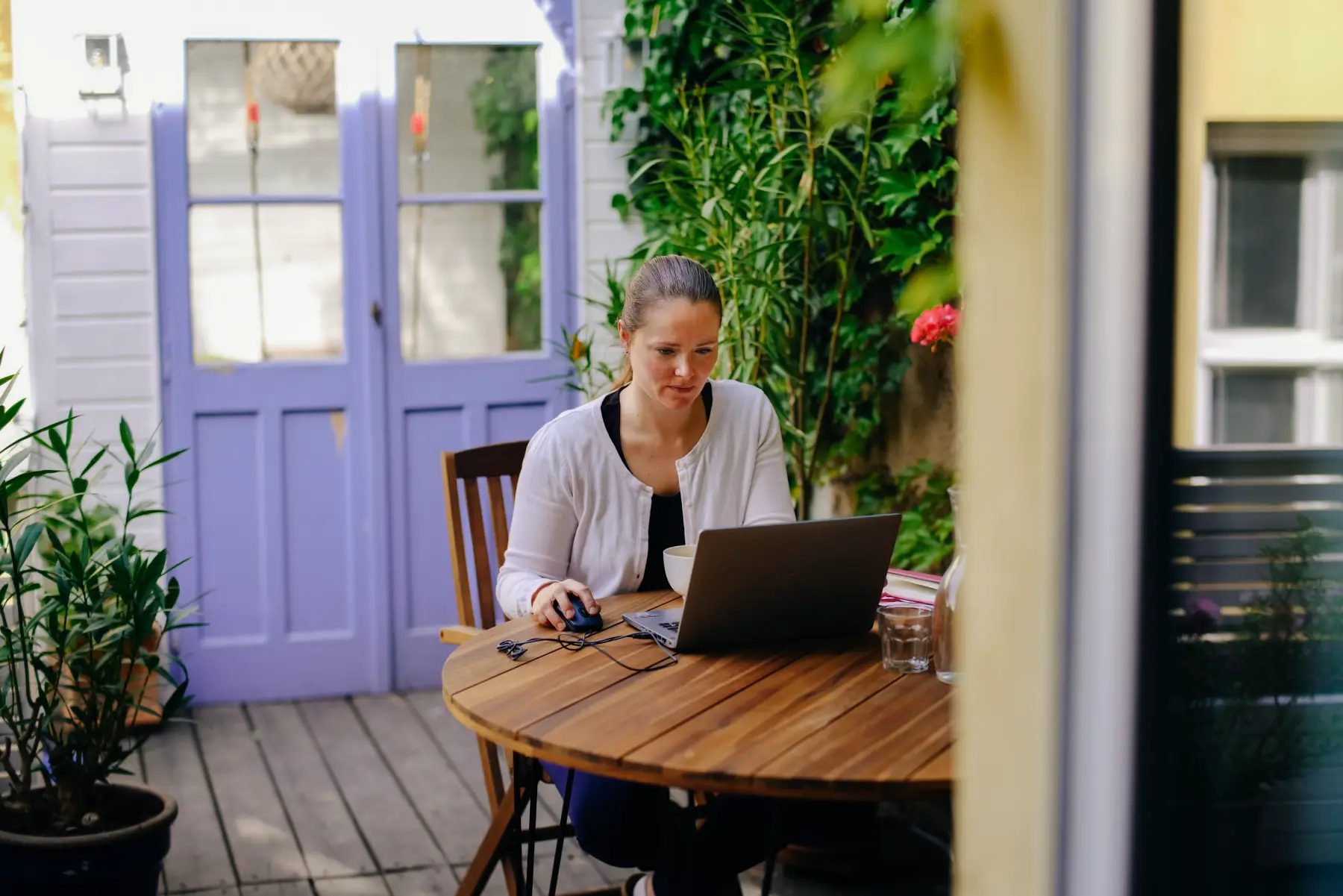Whether you want to work for one of Germany’s big-name brands, or dream of joining a tech start-up in Berlin, understanding the local job market is key to your success. Of course, part of this involves understanding how to write a CV – or Lebenslauf – that meets the expectations of German employers. Knowing how to make a great first impression at job interviews will also increase your chances of landing a role.
So to help you prepare for your job search in Germany, this article outlines the following:
helden.de
Cover your business for professional liability with helden.de. This German insurance company provides a range of policies, each of which comes at a flat rate with transparent pricing. helden.de operate completely digitally, allowing you to handle your coverage quickly and simply. Find a policy to suit your company with helden.de.
The German job market: what to expect when applying for jobs
A good place to begin your job search in Germany is by joining recruitment and networking platforms such as LinkedIn and Xing. This is where most companies advertise their current vacancies. These advertisements will either be in German or English and include details of the day-to-day tasks of the role along with the requirements for applying.
Of course, if you are hoping to land an English-speaking job, finding a listing that in English can be encouraging. However, it is important to carefully check the job description as many roles seek candidates who are fluent in both English and German.

Before you start applying for jobs in Germany and researching the industry and role types that interest you, you might want to familiarize yourself with the country’s labor law and business culture. It’s also wise to get an idea of the average salary bracket for the jobs you want to apply for. That way, you will know what to expect in terms of income.
The application process
You can usually apply for jobs either through an online application portal or by sending your CV and cover letter via email. Notably, it is no longer common practice to send a portfolio folder (die Mappe) along with a cover letter, CV, education certificates, references, and photo by post.
After submitting your CV and cover letter, the company may contact you and invite you to attend an interview with a hiring manager or member of the HR team. It is worth noting that while lower-skilled roles sometimes only require one meeting, higher-skilled positions may involve two or three.
Video call interviews are also common for applicants outside of Germany. That said, some companies will request an on-site meeting as a final step.
A study by Glassdoor found that the duration of the hiring process in Germany is 28.5 days. This falls roughly in the middle of the spectrum when compared to the 24 other countries surveyed. Interestingly, the process is slower in Germany than in the United States (23.8 days), but faster than in France (38.9 days).
How do you write a German CV?
Naturally, you will want to tailor your CV to meet the expectations of local employers. Therefore, below is an outline of the information and format you should use when writing a German CV.
When it comes to which language to use, German-speaking roles expect your CV to be (unsurprisingly) in German. Therefore, it may be beneficial to ask someone with a good grasp of the language to check your resume for you to catch any errors. However, it is best not to ask someone to translate it into German if you do not understand it, as you may risk misrepresenting your abilities.
It is important to bear in mind that if you are applying for German-speaking jobs, you will be expected to converse in the language at the interview stage. If, on the other hand, you are applying for English-speaking roles, your CV should be written in English.
How do you structure a German CV?
Unlike resumes in some European countries, German CVs read more like simple fact sheets rather than documents that contain elaborate details or “waffle”. They should provide a concise overview of your work experience, skills, and educational background, and not exceed two sides of A4 paper.
A German CV typically has the following structure:
- Personal information (Persönliche Angaben): This should include your full name, address, phone number, and email address
- Work experience (Berufserfahrung): You should present this in reverse chronological order (i.e., the most recent first), including the company name, your job title, the dates of employment, and a brief description of your responsibilities
- Education (Bildung): You should provide the names of the institutes you went to, as well as the dates you attended and the qualifications and grades you achieved. Notably, this should come above work experience if you are a new graduate.
- Language proficiency (Sprachkenntnisse): You should use the Common European Framework of Reference for Languages (CEFR) to indicate the level you have achieved in each language
- Skills (Fähigkeiten): Here, you can showcase any skills you have that are relevant to the job you are applying for; for example, IT proficiency, leadership abilities, or project management
Interestingly, it is customary in Germany to add your signature, date, and location at the bottom of your CV. The date and location should go on the left-hand side and your signature should appear on the right.
Notably, when submitting your CV as a PDF document, you can either scan your original signature and add it as an image or use an online PDF editing tool to write it digitally.
Tips on writing a German CV
It is worth noting that while it is not mandatory to add a professional photo to your German CV, some employers still expect candidates to do this. As a result, many people choose to add one.
However, you are also no longer required or expected to specify your nationality and marital status on your German CV. This is an outcome of the General Act on Equal Treatment, a law protecting job candidates from workplace discrimination on the grounds of their ethnic origin.
You should, however, show off your certifications. Indeed, your credentials are highly valued and should always be included when they are relevant to the job you are applying for.
Finally, it is important to remember to stay on topic. Remember, German employers are not interested in non-essential data or excessive descriptions. Therefore, it is best to stick to the facts and let them speak for themselves.
CV templates
If you need help writing your German CV, there are several online resources that offer free templates and resume builders. Some of the most popular ones include:
How do you write a cover letter in Germany?
You should include a cover letter (Anschreiben) with your CV when applying for jobs in Germany. This serves as a formal introduction to you as a person, beyond what can be found on your resume. As with your CV, you can write your cover letter in English if you are applying for an English-speaking role.
Structure and contents
At the top of your cover letter, on the right-hand side, you should include your full name, address, phone number, and email. Below this, on the left-hand side, you should write the recipient’s name, title, company name, and address. However, if you don’t know their name, you can simply write
Personalabteilung (HR department). You should then add the date below the recipient’s information.
You can then add a subject line that is concise and stands out to the recipient. This should convey the position you are applying for and should be in bold font. If you are writing the letter in German, this might read Bewerbung um die Stelle als (‘Application for the position of’) followed by the job title.

You can then open your letter by addressing the name and title of whoever will be dealing with your application. Remember, titles are important in Germany, so don’t forget to include them when you can. For example, you might begin by writing Sehr geehrte(r) Frau/Herr (which means ‘Dear Madam/Sir’) followed by the recipient’s last name. However, if you don’t know their name, you can simply begin with Sehr geehrte Damen und Herren (‘To whom it may concern’).
Next, you should write a brief introduction to yourself, followed by an explanation of why you are interested in the job. You can also explain how your skills meet the requirements of the role. Notably, while it is acceptable to include examples from your previous jobs, you should avoid repeating what can already be found on your CV.
Finally, you should wrap up your cover letter by politely asking for an opportunity to interview. You can then end the letter with Mit freundlichen Grußen (‘Best regards’) before signing and dating it.
Phrases and accented letters
There are several common phrases that are used in German cover letters. Here are just a few to add to your own:
| German phrase | English translation |
| Mit freundlichen Grußen | Best regards |
| Sehr geehrte Damen und Herren | Ladies and Gentlemen / To whom it may concern |
| Sehr geehrte(r) Frau/Herr | Dear Madam/Sir |
| Personalabteilung | HR department |
Job interviews in Germany
What should you expect in a German job interview?
If your CV and cover letter have impressed an employer, you will usually be invited to attend an interview. Of course, it is important to know what to expect when it comes to the big day.
Naturally, the interview procedure will vary depending on the company and the job level. For instance, a single meeting may be sufficient for lower-level roles while mid-to senior-level positions may require at least two.
Initial interviews are usually conducted via a video call or by phone, and typically last 30 minutes or less. This will either be with a recruiter or a hiring manager. The purpose of the meeting is to confirm that you understand the requirements of the role and to see if you are a potential fit.
Second interviews are more likely to be with senior-level managers. These are intended to be a more in-depth discussion of your skills and the job requirements. You can expect them to last between 30 minutes and one hour.
What should you wear to a job interview?
What you wear for your interview should align with the company’s dress code as well as the industry you wish to work in. For example, a start-up in Berlin is likely to be far more casual than a financial institution in Munich.
However, if you aren’t sure of the company’s dress code, then formal attire is best. In Germany, this means wearing a suit or structured dress for women and a suit and tie for men. Notably, you can sometimes find these garments for sale in charity shops for a bargain price.

Moreover, the German Clothing Foundation (Deutsche Kleiderstiftung) may be able to help low-income job seekers in need of professional attire. They help support asylum seekers and victims of natural disasters with clothes and textiles.
What questions should you expect in an interview?
During an interview, you will likely to asked questions about your background, your interest in the company, and why you wish to move to Germany. These might include:
- Do you require a work permit to work in Germany? Be clear about your status when asked
- Tell me about your work history. Practice explaining your experience in two minutes or less. Emphasize duties that align with the work you would perform if you got this job.
- What have been some of your biggest career achievements? Highlight moments when you contributed to a useful outcome. It is also helpful to discuss accomplishments related to overcoming obstacles or developing business relationships.
- What led you to apply for this job? This is a good opportunity to share what inspires you about the company or the position
- What are your salary expectations? Be sure to research market rates for the role in advance. If this comes up early, it is fine to share that you are still looking into the local market to determine an appropriate salary or that you want to learn more about the role before committing to a figure.
- Why are you interested in moving to Germany? Businesses want to be sure you won’t leave in six months when the novelty of living somewhere new wears off. Share any connections you have to the country, as well as research you have done to learn about life in Germany.
- Why are you interested in working for this company? Businesses like to see whether you have taken the time to become familiar with them. This is a good opportunity to bring up a recent news story about the company that you found inspirational or discuss how their values align with yours.
- Why are you looking for a new job now? Avoid speaking poorly of your current employer. Instead, focus on the growth you hope to achieve by securing this new opportunity.
Questions to ask in a job interview
It is also common for candidates to ask the interviewer questions. Therefore, it is wise to come prepared with a few queries about the job and the company to show your interest and make sure that you fully understand the opportunity. Here are some that you might want to ask:
- Are there any technical or management tools that are critical to the job?
- Does the company offer development opportunities such as training or career progression maps?
- Is this job new to the company or an existing job?
- What does success look like in this job?
- What is the company hoping to accomplish with this hire?
You can also end by asking what the next steps are if they have not already been discussed. This will help set your expectations as you move through the interview process.
When are salary and benefits discussed during the hiring process?
Employers may ask for your salary expectations early on in the hiring process. This can occur during an interview call with a recruiter or even as part of the job application. This helps to screen out candidates whose salary expectations do not align with what the company is prepared to offer.

If you are not sure what a fair salary would be for the job, you can always ask to know more about the position before discussing wages.
It is worth noting that if the topic does not come up early, it will likely not reappear until the company is ready to make an offer. This will usually come in the form of an employment contract that spells out all of the terms for employment.
Tips for job interviews in Germany
- Arrive on time: Germans highly value punctuality
- Bring copies of your German CV: Also bring any relevant documents along with you if you are interviewing in person
- Maintain eye contact with the interviewer: This conveys confidence and good manners
- Refer to interviewers by their title: This is the norm unless you have been specifically asked to use a less formal address
- Research the company ahead of time: This way, you can demonstrate your knowledge of the business and impress others
- Shake hands: Do this at the start and end of an in-person interview with everyone present
Online and phone interviews
Video calls are increasingly common for German companies hiring from abroad or even from across the city. Here are some important tips to make a good first impression:
- Conduct the call from a tranquil place: Try to sit in an area with a clean space behind you, or use a virtual background to cut out distractions
- Dress well: Even if the interview is over video, make sure you wear what you would if you were attending in person
- Keep your CV next to you: In case you need it for reference
- Log in a few minutes early: This sets a good impression as the interviewer can connect with you as soon as they are ready
- Test your equipment and your connection: Make sure to do this ahead of your interview
Are recruitment tests standard in Germany?
It is not common to have to take tests during the hiring process in Germany. That said, some technical roles may require a practical test to show your knowledge of the relevant systems.
If you are applying for a German-speaking position, you may also be asked to provide credentials that show your language skills have been tested to a certain level.
Qualifications in Germany
Many jobs in Germany require education or vocational training qualifications. If you have earned qualifications outside of the country, you can submit them to the Central Office for Foreign Education (Zentralstelle für ausländisches Bildungswesen). This government agency is responsible for reviewing foreign degrees and awarding equivalent German credentials.
Germany’s Skilled Immigration Act also offers a fast-track process for reviewing foreign qualifications for skilled workers who have been offered a job in the country.
What happens after your job interview?
The time between an interview and a job offer in Germany varies from company to company. However, generally speaking, businesses move at a steady pace so you shouldn’t have to wait too long for a decision.
In the meantime, you can send thank you notes for interviews with hiring managers or potential colleagues. However, there is no need to send one to a recruiter following a short screening call.

While you are waiting for the news, it is wise to keep up your job hunt. This is also a good time to continue targeted networking on LinkedIn or learn more about global business etiquette.
If you receive a job offer, make sure to review the proposed contract very carefully. It is also important to check for any issues that could cause the agreement to end before signing. Also, keep in mind that probation periods are common for new employees in Germany and may last up to six months.
Useful resources
- Business Network International (BNI) Germany – a professional networking society with branches around the globe
- Federal Anti-discrimination Agency – provides more information about Germany’s anti-discriminatory law that protects workers
- Make it in Germany – a government portal for employed immigrants in Germany





